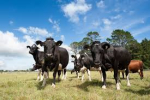Farmers' relationships with their banks are “absolutely” having an impact on their mental health.
That’s according to Federated Farmers domestic commerce and competition spokesperson Richard McIntyre.
McIntyre says that 42.3% of respondents to the Federated Farmers Banking Survey said they felt their mental health and wellbeing were impacted by banking issues.
“That’s nearly half of farmers feeling as if their mental health is suffering as a result of their relationships with banks,” he told Rural News.
“The struggle is real, and this is a huge issue for farmers.”
He says a significant issue is that farmers do not receive enough support from their banks.
According to the banking survey, one in five farmers felt their banks were doing enough to support them during periods of high interest rates.
“In addition, the number of farmers feeling undue pressure from their banks has gone from one in 20 farmers in 2015, to one in four farmers today,” McIntyre adds.
“The pressure farmers are facing from their banks is real and is rapidly becoming the number one issue facing farmers today.”
He says that farmers have accepted that margins on their loans are “a bit higher” than home loans, as there is more risk associated with running a business.
“However, we think this margin is higher than it used to be, and higher than it needs to be,” McIntyre says. “The difference seems to be getting larger.
“The core issue is that banks seem to be pricing for risk, but not actually taking it,” he explains.
“In many cases we’ve seen millions of dollars in equity that should cover the risk of the loan completely, but banks still charging high interest rates.”
McIntyre’s comments come after a Primary Production Select Committee hearing late last month which saw committee members ask for their perspective on the issue of rural bank lending.
ANZ managing director business and agri Lorraine Mapu told the committee that there has been “a lot of discussion” surrounding the cost of borrowing for farmers.
“Interest rates for agri customers are influenced by economic conditions, regulatory settings, and monetary policy,” Mapu says.
She says the higher interest rates farmers have experienced in the past two years are largely due to a combination of the Official Cash Rate (OCR), wholesale rates, and funding costs.
“So, the increase in the amount of capital banks must hold against the lending also has an impact. Risks around the sector impact the amount of capital banks must hold against the lending and therefore the interest they charge.”
Mapu says these risks include volatility in the export market, farmgate prices and inflation.
She says ANZ remains “committed” to supporting farmers.


















